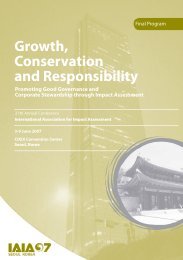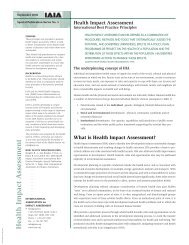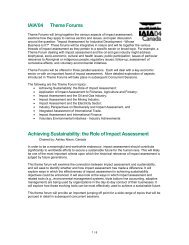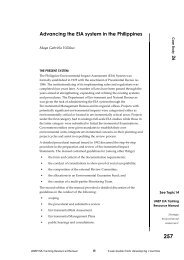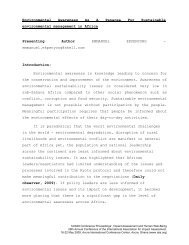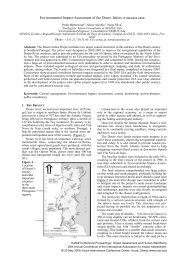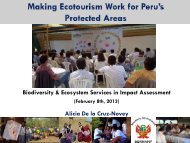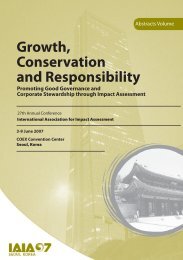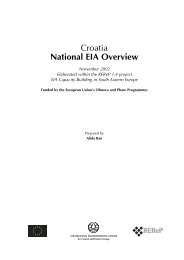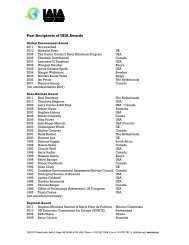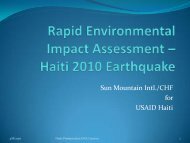Environmental impact assessment in Nigeria - International ...
Environmental impact assessment in Nigeria - International ...
Environmental impact assessment in Nigeria - International ...
Create successful ePaper yourself
Turn your PDF publications into a flip-book with our unique Google optimized e-Paper software.
environment, <strong>in</strong> the course of search<strong>in</strong>g for and produc<strong>in</strong>g crude oil. The<br />
EIA tool is also mandatory for a greater part of the oil E&P activities.<br />
But a detailed exam<strong>in</strong>ation of the various statutes, and the framework for<br />
the EIA process <strong>in</strong> particular, and the entire environmental regulatory<br />
process <strong>in</strong> general, reveals that many of the statutes are very much at<br />
variance with <strong>in</strong>tentions, especially as they affect the execution of functions.<br />
There is duplication of functions and overlapp<strong>in</strong>g responsibilities <strong>in</strong> the<br />
processes and procedures guid<strong>in</strong>g the execution of the various <strong>impact</strong><br />
<strong>assessment</strong> tasks. Consequently, serious bottlenecks and bureaucratic<br />
confusion are created <strong>in</strong> the process. The result is a waste of resources,<br />
f<strong>in</strong>ancially and materially.<br />
This paper exam<strong>in</strong>es the statutory regulatory framework for the EIA<br />
process, and the <strong>in</strong>adequacies and mis<strong>in</strong>terpretations of the various statutes,<br />
which have often led to delays <strong>in</strong> the execution of EIAs <strong>in</strong> <strong>Nigeria</strong>. An<br />
attempt will be made to streaml<strong>in</strong>e these various responsibilities through a<br />
reorganization of the regulatory environmental framework. This way, it is<br />
hoped that the bottlenecks and wastage of resources will be elim<strong>in</strong>ated.<br />
INTRODUCTION<br />
<strong>Nigeria</strong> (Africa’s most populous nation), <strong>in</strong>dependent s<strong>in</strong>ce 1960, occupies<br />
an area of 923,768 km 2 with varied climates and seasons. Presently, its<br />
estimated population is over 100 million people.<br />
Prior to oil, agriculture (before 1970) was the economic ma<strong>in</strong>stay. With<br />
f<strong>in</strong>ancial resources available from oil and no development policy, unguided<br />
urbanization and <strong>in</strong>dustrialization took place. Uncontrolled population<br />
growth, desertification, and deforestation led to degradation and<br />
devastation of the environment.<br />
As desirable and necessary as development is, it became an albatross not of<br />
itself but because of the lack of appropriate policies to guide it.<br />
There were several sectoral regulations aimed at controll<strong>in</strong>g environmental<br />
degradation which were unsuccessful due to the absence of effective<br />
sanctions. Economic considerations and fundamental lack of knowledge of<br />
<strong>in</strong>terdependent l<strong>in</strong>kages among development processes and environmental<br />
factors, as well as human and natural resources, resulted <strong>in</strong> an unmitigated<br />
assault on the environment. However, the environment and the need for its<br />
preservation (<strong>in</strong> spite of all efforts by United Nations Environment Program<br />
[UNEP] and <strong>International</strong> Conventions which <strong>Nigeria</strong> ratified), took centre<br />
stage after the momentous and s<strong>in</strong>gular event of the secret dump<strong>in</strong>g of toxic<br />
waste <strong>in</strong> Koko Port, Bendel State (now Delta State) <strong>in</strong> May 1988 by foreign<br />
parties. This was followed by the promulgation of the Harmful Wastes<br />
(Special Crim<strong>in</strong>al Provisions) Act 1990. In its wake, <strong>in</strong>ternational sem<strong>in</strong>ars<br />
and workshops were held <strong>in</strong> Abuja and Lagos and the consensus was for<br />
64<br />
UNEP EIA Tra<strong>in</strong><strong>in</strong>g Resource Manual ® Case studies from develop<strong>in</strong>g countries


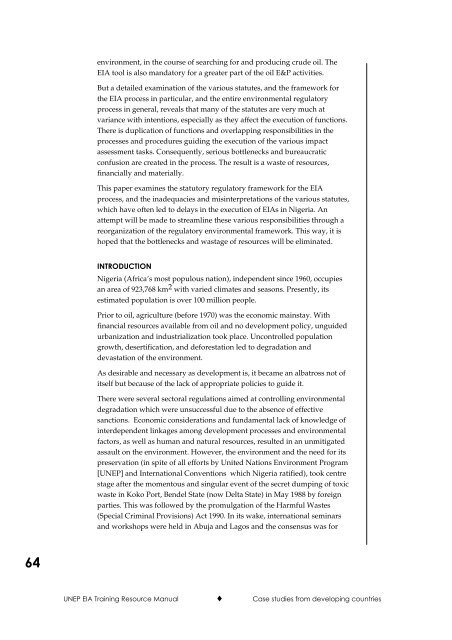
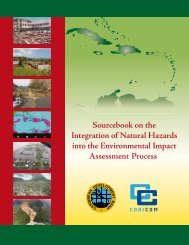
![Session Report [PDF] - International Association for Impact Assessment](https://img.yumpu.com/22416146/1/190x245/session-report-pdf-international-association-for-impact-assessment.jpg?quality=85)
![Session Report [PDF] - International Association for Impact Assessment](https://img.yumpu.com/22416140/1/184x260/session-report-pdf-international-association-for-impact-assessment.jpg?quality=85)
